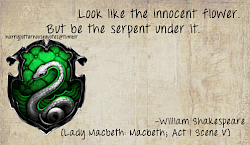What Hogwarts House Would Macbeth be Sorted Into?
Macbeth is, I’d argue, Shakespeare’s most widely popular tragedy. I think the reason for this is simple: everyone secretly, desperately wants to be a Slytherin.
You might be saying ‘Wow Steph, you’re an idiot. Our intrepid teen heroes are Gryffindors so obviously everyone wants to be one of those.’ To that, I’d say you’re probably right about the first part, but as for the second…Most people will say they’re a Gryffindor because it’s cool and heroic and HARRY IS ONE, but deep down ask yourself what appeals to you more:
Running into danger headfirst with no discernable plan for the chance of glory?
or
Carefully planning your ascent to greatness with a proper risk evaluation to protect yourself?
If you’re being honest, you’re probably going to choose the option that has the safer, cleverer plan.
Now, hear me out: I’m not trying to argue that people want to be the trash-person, murder-happy, purebloods-only type of Slytherin, I’m focusing on the idealized ambition-first, willing-to-push-limits, clever type of Slytherin. There’s something inherently romantic about having big dreams and knowing you’ve got what it takes to reach those heights.
I say all this, but I want to make it clear that don’t think Macbeth is a Slytherin. I think he’s a Gryffindor – he’s all brute and no brains (sorry, Gryffs…). He lets himself be led by the influence of others and doesn’t stop to think through the potential consequences of his actions. His ‘plan’ is SLICE STAB MURDER, and well, I won’t spoil the 400-year-old ending of how well that works for him.
From that point, I also want to make it clear that I don’t think Macbeth the character is the reason we love Macbeth the play so much. Lady Macbeth is.
She’s one of Shakespeare’s most badass female characters – and I think she’s so appealing to an audience and an actor because deep down we very much want to have that strength to stand up to people, directly call them out when they go back on their word, and be the brains behind the successful plan. She’s got the cunning and the nuance of manipulation that Slytherins are known for, but what separates her from our storybook villains and makes her so much more relatable to what might actually happen if we gave into our Slytherin desires, is that we see her break down. It’s Draco crying in a bathroom – the most stunningly real and heartbreaking part of the whole series if you ask me. Very Shakespearean.
From the beginning, she knows that as a woman she can’t take power on her own, and that frustrates the heck out of her – she’s Taylor Swift singing “If I was a man then I’d be THE man” (in iambic pentameter no less). But, she has a plan and she uses the resources she does have to make sure it happens. It’s only when the control and power are taken away from her (Macbeth starts killing for paranoia’s sake and leaving her out of it), that things start to spiral. This loss of trusted partnership and control affects her in a way that her brings all her insecurities and frustrations to the forefront. This is still a very Slytherin quality – to protect yourself when things have gotten beyond your control. It’s also very relatable.
We are on Lady Macbeth’s journey through this play – from hope to success to despair – she splays the depths of our souls on stage and overall it does not go well.
The roller coaster of presenting a character like this that shows us a glimpse into what we really could want from life, only to dash it down completely, is what makes theatre –this play especially—so brilliant. Shakespeare lets us see what we could be but then confirms what we know to be true, that most of us are actually either Ravenclaws or Hufflepuffs and should be happy to stay there in our much safer – though much less dramatic – houses.


